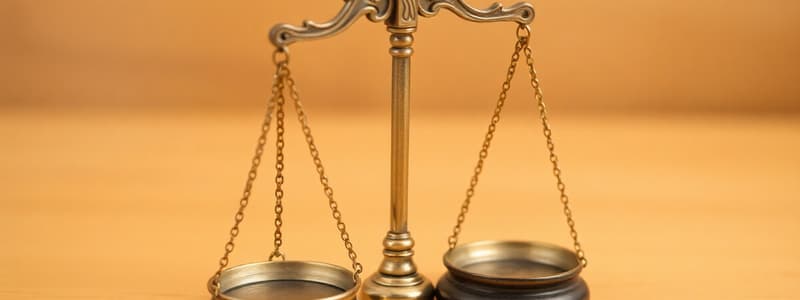Podcast
Questions and Answers
What does the concept of 'overlapping consensus' refer to?
What does the concept of 'overlapping consensus' refer to?
- A conflict among individuals about justice principles
- A single doctrine that everyone agrees upon
- An agreement among people with various doctrines on basic justice principles (correct)
- A universal agreement on all moral doctrines
What is the primary focus of distributive justice?
What is the primary focus of distributive justice?
- The equitable distribution of power among individuals
- The establishment of a social contract among individuals
- The moral justification of legislative actions
- The study of how resources, opportunities, and benefits should be distributed (correct)
Which describes a 'well-ordered society'?
Which describes a 'well-ordered society'?
- A society where institutions align with principles of justice as fairness (correct)
- A society where institutions act independently of justice principles
- A society that prioritizes individual interests over collective justice
- A society governed by arbitrary rules and regulations
What does Rawls’ concept of 'global justice' refer to?
What does Rawls’ concept of 'global justice' refer to?
What does the term 'legitimate power' signify?
What does the term 'legitimate power' signify?
What does the Difference Principle state?
What does the Difference Principle state?
What does the Maximin Rule advocate for?
What does the Maximin Rule advocate for?
In the concept of the Veil of Ignorance, what are individuals unaware of?
In the concept of the Veil of Ignorance, what are individuals unaware of?
What is the focus of Fair Equality of Opportunity?
What is the focus of Fair Equality of Opportunity?
What are Primary Goods?
What are Primary Goods?
What is the aim of Public Reason in political decisions?
What is the aim of Public Reason in political decisions?
What are the Two Principles of Justice proposed by Rawls?
What are the Two Principles of Justice proposed by Rawls?
Reflective Equilibrium is a process for what purpose?
Reflective Equilibrium is a process for what purpose?
Flashcards
Overlapping Consensus
Overlapping Consensus
Agreement on basic justice principles among people with differing beliefs, even if their reasons for agreeing differ.
Social Contract
Social Contract
A hypothetical agreement between individuals to form a society based on agreed-upon principles of justice.
Distributive Justice
Distributive Justice
The study of how resources, opportunities, and benefits are fairly allocated in society.
Well-Ordered Society
Well-Ordered Society
Signup and view all the flashcards
Global Justice
Global Justice
Signup and view all the flashcards
Justice as Fairness
Justice as Fairness
Signup and view all the flashcards
Original Position
Original Position
Signup and view all the flashcards
Veil of Ignorance
Veil of Ignorance
Signup and view all the flashcards
Difference Principle
Difference Principle
Signup and view all the flashcards
Maximin Rule
Maximin Rule
Signup and view all the flashcards
Two Principles of Justice
Two Principles of Justice
Signup and view all the flashcards
Basic Liberties
Basic Liberties
Signup and view all the flashcards
Fair Equality of Opportunity
Fair Equality of Opportunity
Signup and view all the flashcards
Study Notes
Rawls' Theory of Justice: Key Concepts
- Justice as Fairness: Rawls' core concept of justice, where fair principles benefit all.
- Original Position: A hypothetical agreement, choosing justice principles behind a "veil of ignorance."
- Veil of Ignorance: Individuals, unaware of their social standing, choose fairness principles.
- Difference Principle: Social inequalities are justified only if they help the least advantaged.
- Maximin Rule: A strategy to maximize well-being for the worst-off, central to Rawls' approach.
- Two Principles of Justice: 1) Equal basic liberties for all, and 2) social/economic inequalities benefit the least advantaged.
- Basic Liberties: Fundamental rights like speech, voting, and property ownership.
- Fair Equality of Opportunity: Equal chances for social and economic success, irrespective of background.
- Primary Goods: Desirable goods (liberties, income, wealth, self-respect) desired by all rational people.
- Reflective Equilibrium: Adjusting principles and judgments for coherence in moral reasoning.
- Public Reason: Political decisions justified by principles acceptable to all reasonable citizens.
- Political Liberalism: Rawls' theory aimed at justice in pluralistic societies through overlap among views.
- Overlapping Consensus: Agreement on justice principles amidst different moral/philosophical views.
- Social Contract: A hypothetical agreement for forming a society, a foundation of Rawls' theory.
- Distributive Justice: Discussing fair distribution of society's resources, opportunities, etc.
- Well-Ordered Society: A society where all institutions follow justice as fairness principles.
- Global Justice: Rawls' view on justice among nations and individuals globally.
- Legitimate Power: Just power, in accordance with justice principles, accepted by those it governs.
- Political Conception of Justice: Principles of justice derived from shared understanding, not from specific doctrines.
- Basic Structure of Society: Institutions shaping social, economic, and political interactions.
Studying That Suits You
Use AI to generate personalized quizzes and flashcards to suit your learning preferences.




